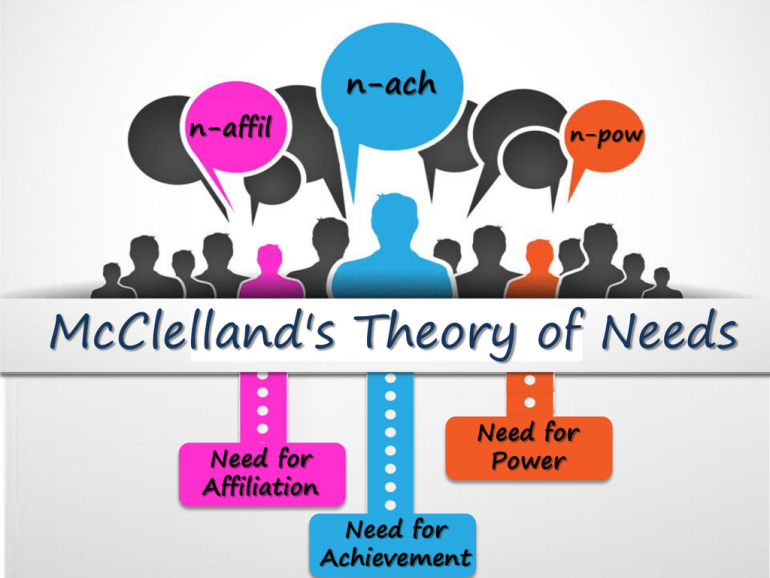
McClelland’s Theory
In the early 1961s, David McClelland built on this book “The Achieving Society.” He identified three motivators that he believed we all have is a need for achievement, a need for affiliation, and a need for power. People will have different characteristics depending on their dominant motivator. According to McClelland, these motivators are learned which is why this theory is sometimes called the Learned Needs Theory. This dominant motivator is largely dependent on our culture and life experiences.
These characteristics are as follows:
Achievement
- Has a strong need to set and accomplish challenging goals.
- Takes calculated risks to accomplish their goals.
- Likes to receive regular feedback on their progress and achievements.
- Often likes to work alone.
Affiliation
- Wants to belong to the group.
- Wants to be liked and will often go along with whatever the rest of the group wants to do.
- Favour collaboration over competition.
- Doesn’t like high risk or uncertainty.
Power
- Wants to control and influence others.
- Likes to win arguments.
- Enjoys competition and winning.
- Enjoys status and recognition.
McClelland’s theory can help the organisation to identify the dominant motivators of the employee in the team. It then can use this information to influence how to the set goals and provide feedback and how to motivate and reward the team members. This McClelland’s theory can also use for motivators to craft, or design, the job around the team members and ensuring a better fit.
The following two steps process can be used to apply McClelland’s theory:
Step 1: Identify the Motivational Needs of the Team
Examining the team to determine which of the three needs is a motivator for each person. Personality traits and past actions can help in this process.
Step 2: Approaching Team According to To Their Need type
Based on the motivating needs of the team members, alter your leadership style to assign projects according to the type of need of each individual team member.
With reference to the identification of the motivational needs, at Alchemy we have developed a profiling tool to help you identify the motivators of your team members. Contact us for more information on our profiling tool today enquires@alchemyconsultancy.asia.
These motivators are not inherent we develop them through our culture and life experiences. Achievers like to solve problems and achieve goals. Those with a strong need for affiliation don’t like to stand out or take risks, and they value relationships above anything else. Those with a strong power motivator like to control others and be in charge. This information can be used to lead, praise, and motivate the team more effectively, and to better structure the team’s roles.
As an HR consulting organization, we at Alchemy Resources pay huge importance and have implemented these practices in our own workplace. We have conducted training programmes and meetings for employees as well as managers to identify the characteristics they carried out.
At ARSB, we have designed our training intervention strategies using the given methods and have executed our training programme using Learning Management System (LMS) through both synchronous and asynchronous. Contact us to find out how we may work together to conduct a training programme to improve performances and achieve your company’s goals.


